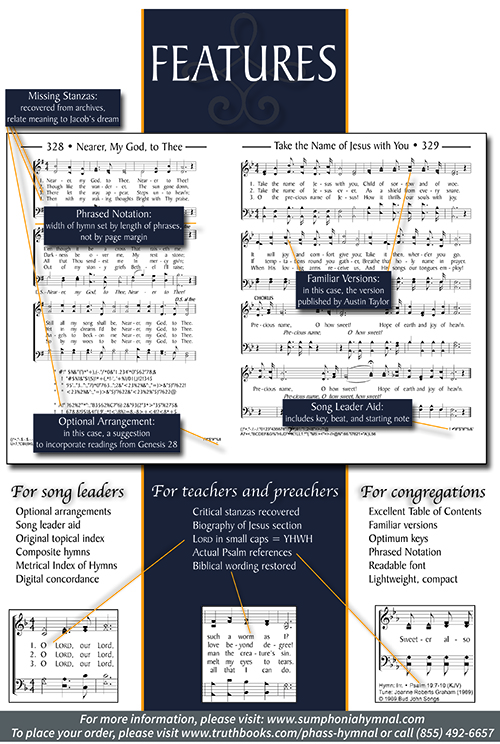

by Shawn Chancellor
Synopsis: Shawn reminds us that the Bible can be divided into three distinct dispensations in which God progressively revealed both Himself and His redemptive plan to mankind.
The Bible presents a single cohesive story, describing God's redemption of a holy people with whom He will have fellowship throughout eternity. A close reading of the story reveals three distinct periods, marked by a progression in God's revelation and a change in the law by which He regulates His fellowship with man. These periods are often called the Patriarchal, the Mosaic, and the Christian Dispensations.
Webster defines dispensation as "a general state or ordering of things specifically: a system of revealed commands and promises regulating human affairs… a particular arrangement or provision especially of providence or nature." The KJV uses "dispensation" in Ephesians 1:10, referencing "the dispensation of the fulness of times," where it means, "state of being arranged, arrangement, order, plan" (BDAG). So, when we speak of dispensations, we recognize the various ways that God has spoken to and governed man through time to bring about His eternal purpose in Christ.
In the Patriarchal Dispensation, God revealed, in broad strokes, both His nature and His plan. From the very outset, both God's holiness and man's need for obedience were revealed as man sinned and experienced the inevitable separation from God that sin incurs (Gen. 3:1-24; 4:8-16). Further, while God's judgments are fearsome, He is a gracious God (Gen. 6:1-8). Even as man fell into sin, God showed love and mercy by revealing that He has every intention of providing for the redemption of mankind. In Genesis 3:15, we find the first promise of a Savior who would defeat our enemy and provide lasting peace between God and His people.
In the Mosaic Dispensation, God began to refine the plan, revealing what a holy people should be. During this epoch, God separated a people, and formed them into a kingdom of His own making. God showed that it is obedience from a heart of love that He truly desires (Deut. 30:6-14), and that His law marks the boundaries of this loving relationship (Deut. 30:15-20). During this time, God also revealed man's overwhelming need for a true redemptive sacrifice (Lev. 16:29-34; 17:11; Heb. 10:1-4). The prophets made it clear that God would provide this sacrifice. They offered a more precise picture than the previous dispensation, by demonstrating not only that God would defeat Satan, but that the Messiah would accomplish this victory by becoming the sacrifice that redeems (Isa. 53:7-11).
In the Christian Dispensation, God brings His plan into perfect focus. The Gospels reveal Jesus as the Son of God (Luke 1:30-33), the sacrificial Lamb who will "take away the sin of the world" (John 1:29). The New Testament reveals that redemption is not only forgiveness of sins, but in fact, a true death reversal, allowing for the eternal peace between God and His people (1 Cor. 15:50-57). The New Testament also refines the view of God's people by revealing the kingdom of God as the "body of Christ" (Eph. 1:22-23), a "dwelling of God" (Eph. 2:22), and a bride loved by her Husband (Eph. 5:23-27).
In each dispensation, God's servants are given roles in the redemptive plan. Abraham moved to Canaan and began the lineage from which the Christ later came. In Israel, we see a priesthood formed which emphasized the need for sacrifice and access to God. The apostles reveal to us the identity of the Savior and the conditions of participation in His body. At each stage of the plan, God revealed to His servants what they needed so that they would be able to carry out the work they are given (1 Pet. 1:10-11).
The Christian age is the pinnacle of the Bible story. God's plan is fully revealed, and the steps necessary for redemption are executed. Both the Patriarchal and Mosaic Dispensations point to the Christian age through divine promise and prophecy, but also through revelation of the attributes and character of God. Consider the following examples.
God is the Eternal Creator (Gen. 1:1). During the Patriarchal Dispensation, this emphasized God's right to rule over His creation as He destroyed through floods (Gen. 6:17-24), scattered mankind due to rebellion (Gen. 11:5-9) and promised to judge nations for their sins (Gen. 15:12-21). In the Mosaic age, this truth elevated Jehovah God above all false gods. As Creator, we learn that Jehovah has the right to be jealous over His people and demand that they turn to Him rather than seek out others (Isa. 40:18-26). The New Testament recognizes the need to answer the question: why should men submit to Jesus of Nazareth? Both John and the author of Hebrews offer the creation as the answer. John begins his gospel by proclaiming that Jesus is the eternal Word of God and the agent of creation (John 1:1-3, 14-18). Likewise, the Hebrew writer expresses the supremacy of the Son by stating that it was the Son "through whom also He made the world" (Heb. 1:3).
God is patient and compassionate toward His people. In the Patriarchal Dispensation, He preserves mankind, and the Messianic promise by bringing Noah through the flood. He patiently endures the missteps of Abraham, Isaac, and Jacob, working through them to produce the people through whom the Messiah would come. In the Mosaic age, He was longsuffering with Israel and Judah to keep His promise of salvation. The book of Judges is notable for the demonstration of divine longsuffering as, again and again, God disciplined His people so that they would return to Him. In the present age, we have the ultimate example of divine patience as the Father sends His Son to save men from their sins only to see Him rejected by His own. Again, Jesus is presented as our compassionate High Priest to whom we can turn to "find grace to help in time of need" (Heb. 4:14-16).
Another important thread that runs through each dispensation is the principle of salvation. The current dispensation is often referred to as the Dispensation of Grace. This seems to imply that grace was absent from the previous ages and that somehow the principle of salvation has changed. However, the Scriptures reveal that salvation has always been available to those who believe God's word and obey His commandments.
Noah, "being warned by God," believed that God would bring the flood, and "prepared an ark for the salvation of his household," thus becoming "an heir of the righteousness which is according to faith" (Heb. 11:7, NASB). The divine warning, the command to build the ark, and the preservation of Noah's family were demonstrations of divine grace.
Likewise, Israel learned they could "choose life" if they would obey the statutes and commandments that God had given them (Deut. 30:15-20). Again, the law itself was an act of grace revealing what fellowship with God required and what could be done to regain that fellowship if violated.
Today, these same principles apply. While the commandments of this age are different, nonetheless, salvation is conditioned on faith in God and obedience to His commandments. Jesus, the ultimate example of divine grace, has paved the way for our salvation (Rom. 3:21-26). We are commanded to have faith in the gospel as "the power of God unto salvation" (Rom. 1:16). Finally, we appeal to God's grace through obedience knowing that He alone has the power to save. (Col. 2:10-14).
BDAG = Arndt, William, Frederick W. Danker, Walter Bauer, and F. Wilbur Gingrich. A Greek-English Lexicon of the New Testament and Other Early Christian Literature. Chicago: University of Chicago Press, 2000.
Webster = Merriam-Webster's Collegiate Dictionary. Springfield, MA: Merriam- Webster, Inc., 2003.
Author Bio: Shawn has been working with the South Georgia Street congregation in Amarillo, TX for the past three years. He and his wife, Bonnie, have one daughter, Colby. The church website is sgeorgiastreet.church. He can be reached at shawn.chancellor@gmail.com.

